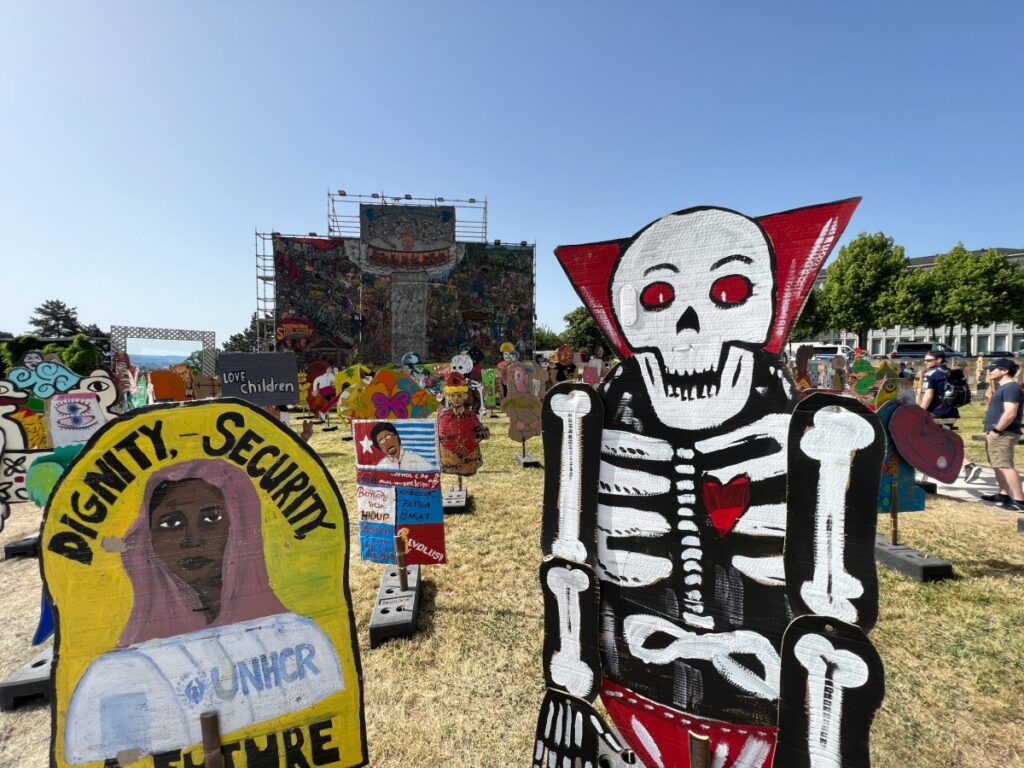What we like
Documenta Artists “Outraged” Over Censorship of Pro-Palestine Films
An open letter co-signed by 100 individuals and organizations says the festival’s advisory council has miscast any criticism of Israel as antisemitic.

An open letter published in e-flux this weekend and co-signed by almost 100 individuals and organizations in Documenta 15’s “lumbung community” condemns the exhibition’s leaders for allowing a “hostile environment” to prevail at the international contemporary art show hosted in Kassel, Germany.
The most recent offense the letter responds to is a preliminary assessment, released by Documenta’s advisory council this month, recommending the censorship of a film screening by the collective Subversive Film. According to a press release, the panel came to a consensus that the “most urgent task” was to immediately stop showing Tokyo Reels Film Festival (TRFF), a set of freshly restored films originally made between the 1960s and ’80s exploring Japanese and Palestinian anti-imperial solidarity. In a curatorial statement submitted to the exhibition, Subversive Film called these films “militant cinema.” Currently, Documenta’s website continues to list two upcoming TRFF screenings for the evenings of September 14 and September 21.
In response to Hyperallergic’s request for comment, Documenta 15’s press coordinator sent the following statement: “The management of documenta and ruangrupa have taken note of the assessment of the committee. ruangrupa, as the Artistic Direction of documenta fifteen has the sole right to decide and does not wish to follow the recommendation to temporarily remove the work Tokyo Reels by Subversive Film from the exhibition.”
The advisory committee deemed the films, as well as talks accompanying the screenings, inappropriate. “What is highly problematic about this work is not only the films, which contains antisemitic and anti-Zionist elements, but also the comments inserted between the films, which legitimize the hatred of Israel and the glorification of terrorism in the source material through heir uncritical discussion,” the council determined. It then proceeded to criticize the “one-sided” portrayal of Israelis and Palestinians in the films and the characterization of Israel as “fascist.” The council’s statement invoked the International Holocaust Remembrance Alliance’s definition of antisemitism to argue that TRFF qualifies as antisemitic.
The September 10 open letter — signed by Documenta 15’s curatorial group ruangrupa, Palestinian artist collective the Question of Funding, and Subversive Film, all of whom have now been targets of antisemitism allegations in the course of Documenta 15’s lead-up and run — pushes back on the advisory council’s verdict.
“We do not accept the allegations of their preliminary report, which unashamedly reproduce poorly researched claims from the media; likewise, the report lacks scientific proof, academic references, rigorous argumentation and integrity,” the open letter reads. The writers specifically take issue with the International Holocaust Remembrance Alliance’s definition of antisemitism, contending that it miscasts any criticism of Israel as antisemitic, and denounces the council’s categorization of TRFF as “propaganda.”
“Their simplistic notion of ‘propaganda’ enables a specious argument that critique of the State of Israel is an incitement of hatred of an entire people—this is a very serious accusation that shocks and hurts us,” the letter continues, reiterating support for Jewish “comrades” whom they are united with in the struggle against the Israeli state.
Beyond refuting the council’s argument, the open letter criticizes Documenta’s role in cultivating an environment in which artists and curators have been subject to a relentless smear campaign. “We are outraged, we are exhausted, but our struggle will continue,” it reads.
Documenta has not responded to Hyperallergic’s immediate request for comment.
In August, Documenta’s shareholders assembled a “scientific advisory committee” comprised of seven academics with expertise variously in the areas of antisemitism, post-colonialism, and art law “in the light of antisemitic incidents” that had allegedly transpired at the exhibition. “The reoccurring antisemitic motifs seen at documenta fifteen demonstrate the continuous actuality and reproduction of antisemitism. It is therefore essential, that the antisemitic incidences and the related reception and events are reviewed and examined by the scientific advisory panel,” Angela Dorn, the Hessian minister for Higher Education, Research, Science, and the Arts, said when the council was announced.
This development at Documenta 15, which closes in less than two weeks, is the latest chapter in a public row between curators, artists, and exhibition organizers that has been ongoing since before the show even opened. Allegations of antisemitism first surfaced in May when German media outlets picked up a pro-Israel blogger’s claims that the curators of and artists participating in Documenta 15 were antisemitic. An open letter responding to these allegations at the time labeled them “bad-faith attempts to delegitimize artists.” In late May, threatening vandalism appeared in exhibition spaces associated with The Question of Funding. In late June, Documenta removed an artwork called “People’s Justice” by Indonesian collective Taring Padi in its exhibition after it became the subject of scrutiny over antisemitic depictions. Former director Sabine Schormann resigned in mid-July.
Editor’s note 9/13/22 10:15am EDT: This article has been updated with a statement from Documenta’s press coordinator.


